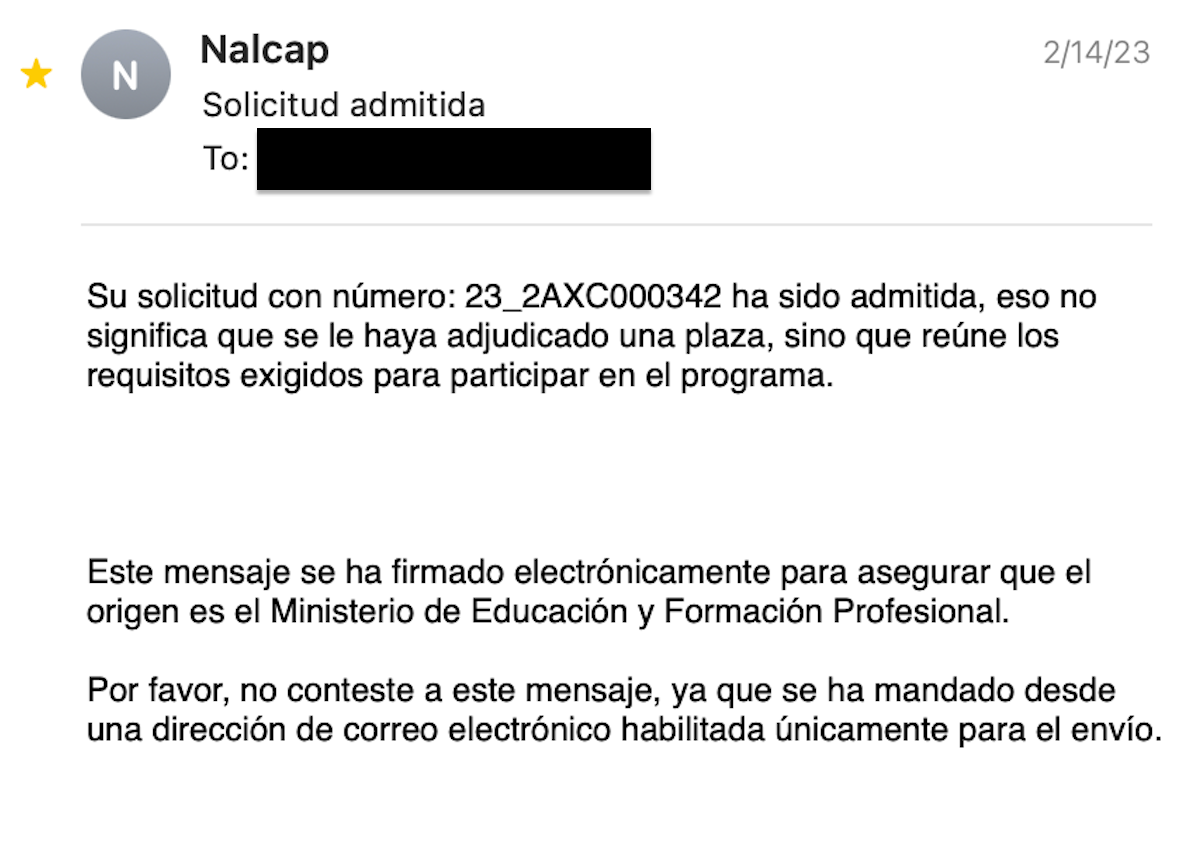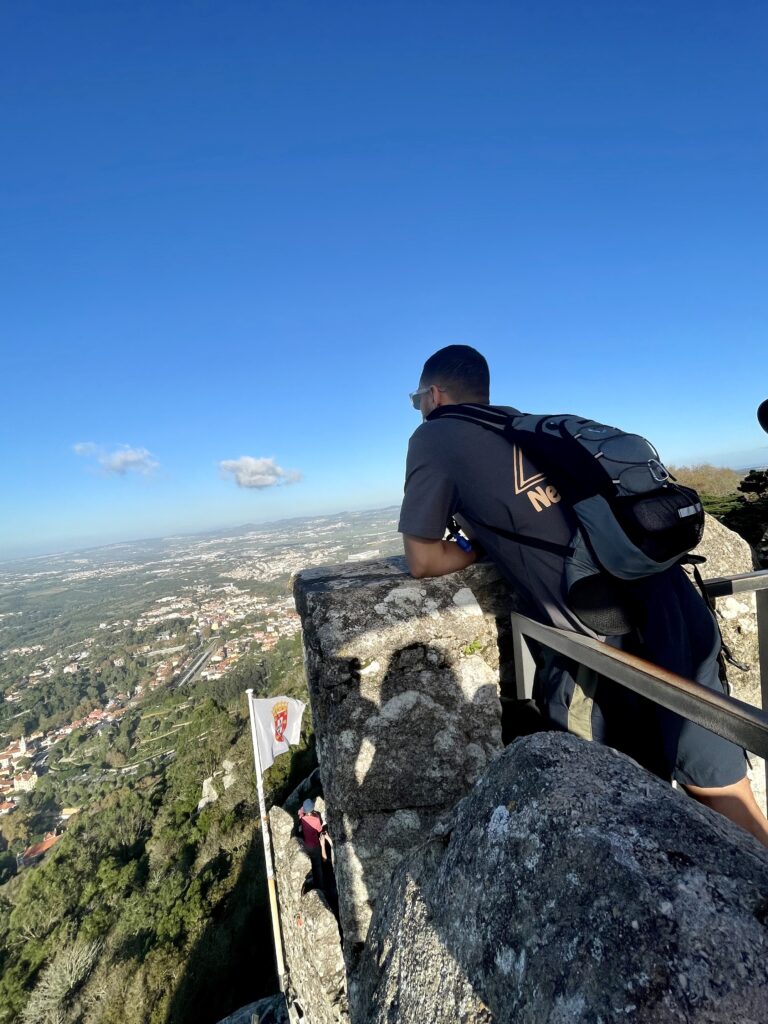Have you ever thought about teaching English abroad?
Ever considered living in Spain?
Feel the deep urge to escape the routine of everyday life?
Want to take a structured gap year?
If you answered yes to any of those questions, I think you should consider applying to NALCAP.
Read on for a simple guide on how to do exactly that!
“Before I can think of applying, I need to know what NALCAP is!”
Chances are if you’re reading this, you’re already familiar with NALCAP and have perhaps thought about applying to the program.
But if you’re not, here’s a bit of background.
NALCAP (North American Language and Cultural Assistant Program) is a program run by the Education Office of the Embassy in Spain. This office works with the Ministry of Education in Spain to bring American citizens to school classrooms throughout most of Spain.
NALCAP participants, (a.k.a Auxiliares de Conversación) serve as cultural ambassadors, sharing knowledge about the United States and assisting students improve their English skills. At the same time, by living in Spain for 8-9 months, participants also have the chance to immerse themselves in Spanish culture.
Talk about a win-win!
How is NALCAP different from other teaching programs?
NALCAP stands out from other teaching programs because, in many ways, you’re not really teaching.
While your teacher might ask you to prepare some brief lessons related to holidays in the U.S. and potentially take the lead on some other lessons, for the most part, you’ll serve as an assistant to the teacher.
This makes the program much more accessible. Especially to those of us who have never considered teaching as a profession but are interested in everything else NALCAP offers (more on this below)
One important thing to note: all of this will largely be dependent on your specific teacher. Some teachers might want you to take the lead a lot more. Others might try to get you to do more work than you should technically be doing as an Auxiliary de Conversación.
Another key thing I’ve learned throughout my process of applying to NALCAP is that it seems like if folks want to pursue a teaching career or simply want the experience of leading a classroom, they can work with the teacher to have more control of the classroom.
Whether or not Auxiliares are able to do this will, however, depend on the teacher(s) they’re assigned to work with.
This is all pretty different from teaching English as an ESL teacher in Asia, for example. In most of those programs, you ARE the teacher and thus have a lot more responsibility. Nevertheless, folks teaching in Asia also get paid much more!
What also makes NALCAP different from other programs is the relaxed eligibility requirements and how easy applying to the program is. And, if you do everything the way it’s requested on the application, you’re pretty much granted a placement.
How much do Auxiliaries de Conversación get paid?
The salary of an Auxiliare in the NALCAP program is pretty straightforward.
For the vast majority of participating regions in Spain (all 17 during the 2023-2024 application cycle), Auxiliares can expect to get paid at least 800€ every month. Some regions pay a bit more but also require a few more hours of work per week.

Now I know for all my U.S. folks this doesn’t sound like a lot, and to be honest it isn’t.
BUT, with the cost to rent a room in some of the smaller towns throughout Spain getting as low as 250€, the program stipend should be enough to cover food, accommodations, other bills, and a little bit extra for the fun stuff. Please keep in mind the cost of renting your own apartment will be more.
If you’re thinking of applying to NALCAP but are hesitant about salary and cost of living, I highly recommend the following resources to help you plan.
Numbeo is a great resource to help you compare the cost of living in cities across the globe. And on Idealista, you can get a better sense of how much it will cost to rent a room or apartment in a particular city in Spain.
**If you have already applied to NALCAP, do not rent your apartment before you get to Spain. I highly recommend doing this in person so you have a chance to see the apartment and speak to the landlord or listing agent.**
Also, the overall cost of living will be more expensive in the bigger cities, especially Madrid and Barcelona (Cataluña region).
Regardless, if you’re thinking of applying to NALCAP, please remember to go to Spain with some savings. This is especially true if you want to do some traveling during the weekends or long breaks.
For more information on making the monthly stipend work, I highly recommend watching the video below. Natasha’s information was a HUGE help when I was in the process of applying to NALCAP.
Am I eligible to apply to NALCAP?
As I mentioned above, if you want to apply to NALCAP there’s a pretty low bar of entry.
Regarding eligibility, it boils down to just a few things.
1. Be a U.S. Citizen
2. Have a Bachelor’s degree or be enrolled as a Sophomore, Junior, or Senior in a BA/BS program
3. Aged between 18-60
4. Be a native-like speaker of English
5. Have a clean background
And, that’s it!
No special teaching degree or TEFL certificate. Literally no other requirements besides what is outlined above.
Do I need to know Spanish to participate in NALCAP?
Though Spanish proficiency is not a requirement, you will definitely want to know at least some Spanish. You’ll have to find an apartment, open a Spanish bank account, pay bills, etc., and all of those things will be much easier if you know how to speak Spanish.
Knowing how to speak Spanish will also allow you to further immerse yourself in the Spanish culture by building relationships with locals!
Two good places to start learning Spanish are Duolingo and Pimsleur.
Duolingo is great for vocabulary and basics. Pimsleur will help you understand a lot more in a conversational format.
I used Pimsleur to learn Italian and can’t recommend it enough!
If you will be applying to NALCAP, please do yourself a favor and start learning at least some basic Spanish skills. Your experience will be much, much better!
“I’ll be applying to NALCAP, but what documents do I need?”
**Before getting into the nitty-gritty of applying to NALCAP, just a heads up: the application cycle usually runs from early February to early April. And the earlier you apply, the more likely you get one of your top 3 regions!
With that, let’s jump into it.
There are a few aspects of the NALCAP application process that could no doubt be a bit more streamlined (talking about you, Profex #iykyk!). Nevertheless, there’s a really helpful document and tons of Reddit posts that answer the most detailed of questions to the most general.
Essentially, once you’ve made up your decision to apply to NALCAP, you’ll need to gather the following:
1. A copy of your U.S. passport
2. An official college transcript or copy of your diploma
3. A signed statement of purpose
4. A letter of recommendation
The first two are self-explanatory.
The signed statement of purpose is pretty basic. It should state why you’re interested in participating in the program and should be no longer than a page.
The letter of recommendation typically comes from a current or former college professor and should speak to your ability to communicate and handle new situations and environments.
I’ve heard both the statement of purpose and letter of recommendation are hardly read by the Ministry of Education. It seems like all they care about is that both documents are signed and legit.
After you have those documents, head to the Ministry of Education website and create a profile. If you have any questions as you’re applying to NALCAP, feel free to reach out to me. I’m more than happy to answer any of your questions!
But in all honesty, for an even quicker answer, refer to the document. The answer to your question(s) will more than likely be there.
One thing I do have to admit is that, thought the overall process of applying to NALCAP is simple and straightforward. You are guaranteed to get headaches throughout the visa process. There’s a bunch of very tedious tasks that are likely to irritate the calmest of all souls.
Nevertheless, that’s after you’re already applied to the program.
What NALCAP Represents for Me
NALCAP represents a lot of different things for me.
First and foremost, it’s an adult gap year, simple as that.
Being an Auxiliar de Conversación is an opportunity for me to step away from the world of work and explore and experience a different culture different than the one I was raised in. I am well aware, however, that the gap year is likely to last a lot longer than a year, and I’m here for every bit of it!
I don’t know what the future holds past my time in NALCAP, and I can’t emphasize how good it feels not to have a detailed plan. I’m for sure on the pathless path!
Along these lines, I think NALCAP will also give me time to reflect and think about what I want out of life.
Do I really want to jump back into a career in Higher Education?
Is completing my Ph.D. something I still want to do?
How would I design my life if I could have it exactly the way I wanted it?
I think working 12-16 hours per week (with 3-day weekends, potentially 4 depending on what school I’m placed in!) will give me the time and space to start answering these questions.
Last and certainly not least, NALCAP is going to give me time to put my all into this blog. As I’m sure many of you are aware, creating and sustaining a successful blog takes a lot of work. I’m pretty confident that taking a year to do NALCAP will help me get the insights I write in Travels of a PhD to more and more people.
“I’m not sure about applying to NALCAP”
Well, what do you want?
Do you want some time away from the U.S.?
Are you interested in seeing what life in Spain looks like over the long term?
Do you want some space to reflect, away from the pressures of the proverbial “rat-race”?
If you answered yes to any of those questions, you should apply to NALCAP!
If you answered yes but are still hesitant, what’s stopping you?
Why not pull the trigger?
The quicker you can get to the root cause(s) or your hesitancy, the quicker you can decide whether you should be applying to NALCAP.
I have a feeling, though, that the reasons you come up with for applying to NALCAP versus not applying to the program will be much more significant and meaningful.
Share yours in the comments below!
‘Till Next Time, Travel Friends!







